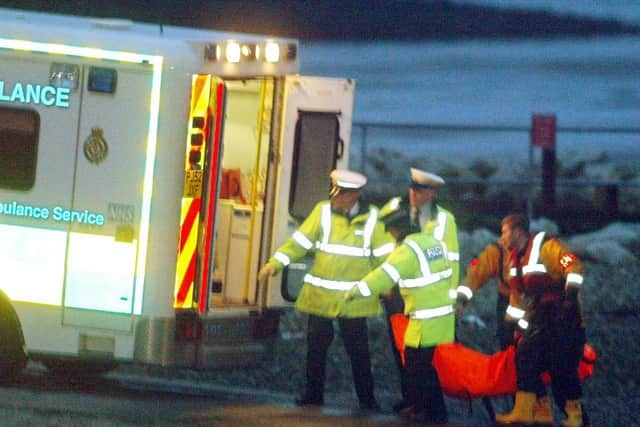Morecambe cockling tragedy 20 years on: like lambs to the slaughter as rising tide engulfed men and women
and live on Freeview channel 276
The date was February 5, 2004, and on the shore at Red Bank near Bolton-le-Sands, a group of 35 bedraggled Chinese men and women were told to hunt for cockles in the driving rain and darkness.
Gangmaster Lin Liang Ren, a self-seeking con artist who trained as an accountant in his native China, gave out the orders.
Advertisement
Hide AdAdvertisement
Hide AdAn opportunist with his eye on the white gold’ of Morecambe’s cockle beds, Lin Liang Ren had a flagrant disregard for human life.There was a high spring tide and the weather over the previous few days had been extremely wet.
This meant the channels were fuller and the tide was faster than any person could run.
At approximately 5pm, local cocklers had started leaving the beds, knowing only too well the dangers of the sinking sands and fast rising tides.Some of the local people approached the Chinese cocklers and tapped their watches in an attempt to warn them not to go out on to the sands.
There was nothing unusual about working at night but, to do this, knowledge of the bay and its treacherous sands was essential for survival.The Chinese people, some of whom had only arrived in the UK a few days earlier and could not speak English, were like lambs to the slaughter.
Advertisement
Hide AdAdvertisement
Hide AdAll were in the country illegally and their cockling permits had been forged by Lin Liang Ren. One of the local fishermen saw a Chinese man who was suffering so much from the cold that he looked as if he was about to collapse and die.Merciless winds and rain were freezing him to the core.
Like that of his fellow cocklers, his clothing was woefully inadequate.
The work was gruelling; it took a massive effort to fill a 40kg bag of cockles.The local cocklers felt frustrated at not being able to halt the exploitation.The bay was a lawless place; a place where health and safety regulations were a cruel joke for the Chinese workers.In an incredibly short time, disaster was upon them.The tide was on the turn and there wasn’t enough time to make it to the shore.Icy water filled up the bay’s channels and gullies, circling some of the terrified cocklers and stranding them on sand banks.
A few cocklers managed to get on to the back of a red Volkswagen pick-up being driven by Lin Liang Ren’s right-hand man Tian Long. He used his mobile to call Liang Ren for help as the cocklers started removing their waterproof clothing.
Advertisement
Hide AdAdvertisement
Hide AdSome of them got off the vehicle on the landward side and managed to make it to the shore.The poor souls who got off on the other side of the truck died in the sea.
Andrew Bowker who had seen lights out in the bay and was concerned when they suddenly went out, made a 999 call at 8.47pm.He was joined by Andrew Butler, a volunteer member of Morecambe Lifeboat, who could see that immediate action was required and ran to the station to raise the alarm there.
The lifeboat and hovercraft were launched, although the hovercraft struggled to cope with the severe winds.


Sixteen volunteers from the lifeboat took part in the gruelling operation.As the black water closed in, cockler Guo Bing Long used his mobile phone to call the emergency services for help.
Advertisement
Hide AdAdvertisement
Hide AdUnable to speak much English, all he could cry was: "Sinking water! Sinking water!"He phoned his family in China to tell them he was in danger of drowning and asked them to pray for him. He said he was sorry and the line went dead. When his wife phoned back, there was no reply.
From 9.15pm, Janie Bannister, the pregnant Liverpudlian girlfriend of cockler Lin Mu Yong, made several calls to the coastguard saying: "I’ve got a load of Chinese boys in the bay and they’re stuck. It’s around the waist, the water.
"The first rescuers on the scene were police who found a group of extremely distressed Chinese people.Out on the sands the rest of the Chinese cocklers were staring death in the face.Far from their homes and families, unable to speak English and call for help, with no lights to guide them and no plan for escape, they clung together as the merciless sea rose up and engulfed them. They also died in the freezing water.Only 11 survivors had made it to the shore; 10 men and one woman.As the tide went out the rescue services had the harrowing task of recovering the bodies from the bay.